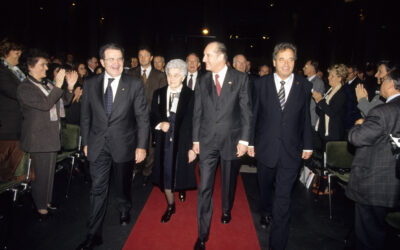Cristina Viano and Jena Debbaneh were the winners of the AIEC scholarship for research on the impact of EoC projects on poverty. Cristina recounts: “The EoC Mission in Serbia turned out to be an excellent place for beginning this study. In fact, in order to enter into the logic of the Economy of Communion it is necessary to understand how these businesses live out the culture of giving each day and what real needs are met with the aid.”  Cristina continues: “Three images stand out and represent the variety of meetings with EoC businesses that we have encountered on this trip. A few farm families reminded us of what lies at the basis of the EoC and the simple and familial and communitarian environment in which it can grow and develop, beginning from the cooperation between small producers and by the gift not of profits but livestock A quite different scene. A large company operating in the field of food and commercial agriculture highlighted the challenges and dilemmas involved in reconciling values of communion and of size and growth, share and investment relations with the local community and with the banks. Finally, there is the image of the EOC with its strong determination to ensure the quality of its products and the jobs of its employees, of expanding its business slowly without borrowing, even offering its customers interest-free loans in a solid mutual trust. It is clear that the Serbian economy still suffers from the consequences of the war. In some areas of the country there is widespread poverty and unemployment is high. For this reason, the spontaneity, consistency and passion that we have encountered in the three examples cited above and in many other regions of Vojvodina provide us with important evidence for the study. It has become even more evident to us that the Economy of Communion does not merely involve an impersonal gift of money, or the application of a particular system of management. It mainly means to live fully immersed in the local scene, finding energy to invent new work from small family production, becoming animators of a community who are able to provide services and be near to those in need.”
Cristina continues: “Three images stand out and represent the variety of meetings with EoC businesses that we have encountered on this trip. A few farm families reminded us of what lies at the basis of the EoC and the simple and familial and communitarian environment in which it can grow and develop, beginning from the cooperation between small producers and by the gift not of profits but livestock A quite different scene. A large company operating in the field of food and commercial agriculture highlighted the challenges and dilemmas involved in reconciling values of communion and of size and growth, share and investment relations with the local community and with the banks. Finally, there is the image of the EOC with its strong determination to ensure the quality of its products and the jobs of its employees, of expanding its business slowly without borrowing, even offering its customers interest-free loans in a solid mutual trust. It is clear that the Serbian economy still suffers from the consequences of the war. In some areas of the country there is widespread poverty and unemployment is high. For this reason, the spontaneity, consistency and passion that we have encountered in the three examples cited above and in many other regions of Vojvodina provide us with important evidence for the study. It has become even more evident to us that the Economy of Communion does not merely involve an impersonal gift of money, or the application of a particular system of management. It mainly means to live fully immersed in the local scene, finding energy to invent new work from small family production, becoming animators of a community who are able to provide services and be near to those in need.”  Jena Debbaneh adds: “Seeing the reality in person is always very different from ‘reading it’ from the numbers. We have met so many people. All of them were ready to share their stories: how and why they received assistance, for how long and how they used it. It was important for us to understand their stories in order to have a precise idea of what “assistance” really is. But their hopes for the future were also important. Their answers contained hope for the future, which made us think that these people are not prisoners of a ‘poverty trap’. I remember one family living on the Belgrade countryside. The questions we had before meeting them became fewer when we were face to face with the reality of their home. There we found extreme poverty, but also joy and hospitality and sharing of food and drinks. We were offered an abundance of food, but also as much happiness and love. It made us realize that this family gave and shared like the poor widow of the Gospel. They were in fact rich because they understood what a culture of giving means.” Jena concluded: “During this trip I came to understand what Chiara Lubich was talking about when she first launched the Economy of Communion in Brazil (1991): Eliminating poverty and inequality by creating businesses with a new culture. The poor are the final goal of the EoC, and their involvement in the business is the means for evaluating its effectiveness.” By Antonella Ferrucci
Jena Debbaneh adds: “Seeing the reality in person is always very different from ‘reading it’ from the numbers. We have met so many people. All of them were ready to share their stories: how and why they received assistance, for how long and how they used it. It was important for us to understand their stories in order to have a precise idea of what “assistance” really is. But their hopes for the future were also important. Their answers contained hope for the future, which made us think that these people are not prisoners of a ‘poverty trap’. I remember one family living on the Belgrade countryside. The questions we had before meeting them became fewer when we were face to face with the reality of their home. There we found extreme poverty, but also joy and hospitality and sharing of food and drinks. We were offered an abundance of food, but also as much happiness and love. It made us realize that this family gave and shared like the poor widow of the Gospel. They were in fact rich because they understood what a culture of giving means.” Jena concluded: “During this trip I came to understand what Chiara Lubich was talking about when she first launched the Economy of Communion in Brazil (1991): Eliminating poverty and inequality by creating businesses with a new culture. The poor are the final goal of the EoC, and their involvement in the business is the means for evaluating its effectiveness.” By Antonella Ferrucci
Solemnity in the present moment
Solemnity in the present moment




0 Comments